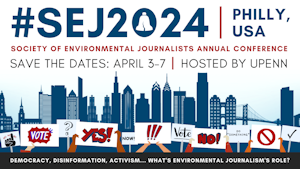SEJournal Online is the digital news magazine of the Society of Environmental Journalists. Learn more about SEJournal Online, including submission, subscription and advertising information.
Should a federal agency be able to tell a science reporter whom they can — and can't — interview? The issue exploded in September with publication of a deeply reported piece on the "close-hold embargo" by Scientific American.
Federal agencies and other news sources (such as science journals) often release stories early to select media outlets under "embargo," the requirement that they not publish until a certain date or time. Many publishers agree to such conditions, because they give reporters time to study, prepare, and report complex stories. Agencies benefit by getting informed, accurate stories in a deadline-driven news cycle.
But what if a reporter writing about a new science study wants to ask other scientists in the field whether it is sound or incomplete? With the embargoed study in hand, the reporter may make calls to ask them about it. But will those calls tip off the world about a forthcoming study?
Under a close-hold embargo, such pre-release calls are restricted by the agency or news source as part of the embargo. The Scientific American exposé details how the Food and Drug Administration (FDA) even specifies whom the reporter can and can't call for comment on a still-embargoed study.
The piece was reported by Charles Seife, a science journalist and professor at New York University who has focused on science integrity issues.
The issue is not new — although it has languished in "inside baseball" obscurity. It came out of the closet in a 2014 New York Times story about new FDA rules on e-cigarettes. Sabrina Tavernise wrote: “F.D.A. officials gave journalists an outline of the new rules on Wednesday, but required that they not talk to industry or public health groups until after Thursday’s formal release of the documents.”
"That’s a concept that gives many journalists the creeps," wrote New York Times then-Public Editor Margaret Sullivan.
- "How the FDA Manipulates the Media," Scientific American, October 2016 issue, by Charles Seife.
- "When Sources Set the Ground Rules," New York Times, May 3, 2014, by Margaret Sullivan (then Public Editor).
- "The FDA Has Been Using Embargoes To Manipulate Journalists. Here’s How." Embargo Watch, September 22, 2016, by Ivan Oransky.
















